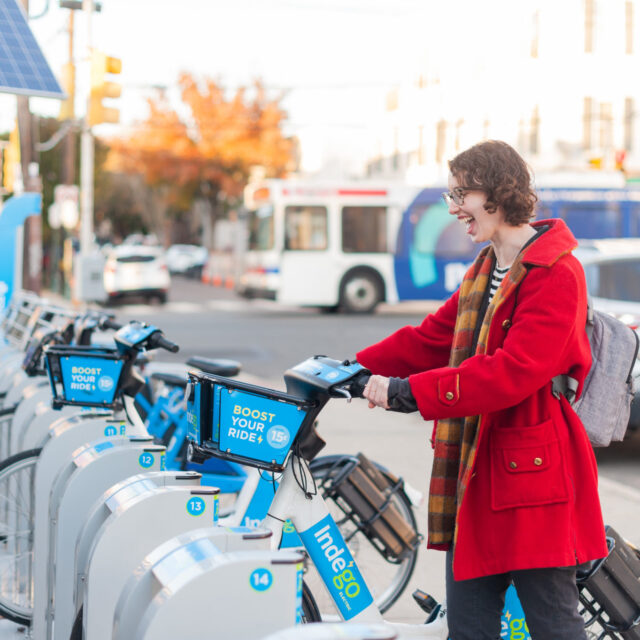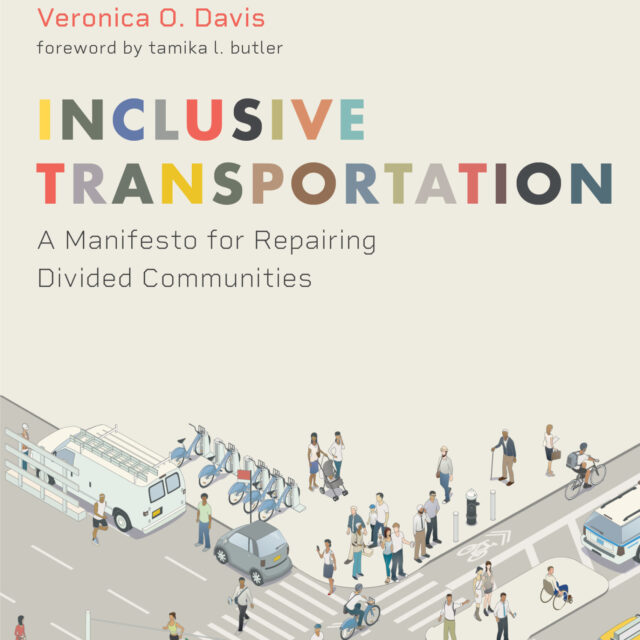Rolling Away: A Writer Says Farewell to Shared Micromobility
by Kiran Herbert, Communications Manager
December 29, 2023
Kiran Herbert, the Better Bike Share Partnership’s writer, editor, and communications manager for the last three years, says goodbye.
 Some jobs are easier to leave than others. That includes jobs where you’re underpaid or undervalued, or where your core values don’t align with the mission. It’s the rare gig that pays the bills while it feeds the soul. My time at the Better Bike Share Partnership falls into the latter category — during my three years as writer, editor, and communications manager here, I’ve always felt like the work I did truly mattered, helping in some small way to move the needle on building a more equitable and sustainable transportation system.
Some jobs are easier to leave than others. That includes jobs where you’re underpaid or undervalued, or where your core values don’t align with the mission. It’s the rare gig that pays the bills while it feeds the soul. My time at the Better Bike Share Partnership falls into the latter category — during my three years as writer, editor, and communications manager here, I’ve always felt like the work I did truly mattered, helping in some small way to move the needle on building a more equitable and sustainable transportation system.
When I started, I knew little about bike and scooter share, having never heard the term “shared micromobility” before. However, as a journalist consumed with creating a more just and sustainable world — as well as someone who, just months before was hit by a truck while walking — the position seemed like the perfect fit. In shared micromobility (SMM), I found something that sat at the intersection of all the things I was passionate about, a mode of transportation that could offer an alternative to single-occupancy vehicles while fostering an all-around healthier society. Of course, SMM only works as a solution if our systems are equitable and that’s where BBSP comes in.
Since launching in 2014, BBSP’s mission has been to help break down barriers to the use of scooter share and bike share in low-income and communities of color. During my time with the partnership, I’m proud of the work I’ve done to help see that mission through, assisting in the dissemination of more than $1.2 million in grants to folks doing the on-the-ground work and helping disseminate ideas, strategies, and best practices from the field through 250 blog posts.
After conducting interviews, reviewing research, attending conferences, and staying abreast of industry news, it’s safe to say I’m now something of an expert on how to create a more equitable SMM industry. While I feel confident that scooter and bike share are here to stay, that future isn’t guaranteed, especially if we don’t figure out a way for them to work for the one in four Americans who remain transportation insecure. As I say goodbye to my role at BBSP, I want to leave readers with a handful of takeaways that I’ve come to believe are crucial to creating a more equitable and lasting bike and scooter share industry.
1. Shared micromobility is transit (and needs to be treated accordingly)
Regular readers have heard me say this before but it bears repeating until cities everywhere start thinking about SMM as a holistic part of their transit systems. Far too often bike and scooter share is left in the hands of private companies with little oversight or foresight regarding how they might play into a bus or train system.
We know that SMM allows people to make first-/last-mile connections and that it can help people access essential services where there are transportation gaps. As such, cities need to begin funding it like transit and ensuring that station planning, marketing, wayfinding, engagement, and pricing are all thought about in the context of the larger transportation ecosystem.
2. Cost remains a major barrier but it’s not the only one
Simply put: If your system doesn’t have a program for individuals living on low incomes, it needs one. And even if there’s a reduced fare program in place that doesn’t mean other barriers to use don’t exist, including making sure people know the program exists and how to access it.
3. Community engagement is a non-negotiable
To figure out what barriers exist, you have to do community engagement. That seems obvious but I’m constantly surprised how many cities and operators still don’t — or devote such a small amount of time and money to engagement that it’s negligible. When it comes to building equity, data is important, but nothing compares to speaking to people and meeting them where they’re at.
4. Achieving gender parity should be a priority
Figure out why women aren’t using your systems and do something about it. This is a major equity issue. There’s also an obvious business case to be made. Plus, when it comes to bicycling women — along with children and the elderly — are an indicator species, meaning that if systems work for them, they work for everyone.
5. Don’t forget about our youth and seniors
During my tenure at BBSP, programs catering to youth and older adults were rare, yet ensuring these populations are using SMM is so crucial to the health of our systems, society, and the planet.
Shared micromobility systems vary widely in their age limits, and while most cite their insurance as a determinate, there doesn’t seem to be good reason as to why 14-year-olds can ride in one city but you have to be 16 in another. We want youth riding because they’re the ones who will inherit the Earth and the fewer people we have bought into car culture going forward, the better. Plus, SMM offers kids freedom and helps get them outside and embedded within their communities.
Seniors are likewise a crucial part of any community and over the next few decades, as baby boomers continue to age, the proportion of Americans age 65 and older will grow from 15% to 24% of the overall population. As with youth, SMM can offer this population freedom while also offering health and wellness benefits, all of which can allow people to age in place — something that benefits society as a whole.
6. We all need to be fighting for better infrastructure
The National Safety Council estimates more than 46,000 people in total across modes were killed in motor vehicle crashes in 2022. That’s the equivalent of a plane crashing every single day for a year, a level of catastrophe we would never stand for. Yet not enough people are fighting for better infrastructure. We also know that if that infrastructure is there, more people — especially women, youth, and seniors — will use micromobility. For people working in scooter and bike share, this should be a top priority, and something we’re all working on garnering more advocates for.
7. Electrification is the future
It seems like the whole world is praying electrification will save us from climate change, and while I’m not in that camp, I do think electric shared micromobility is a no-brainer. Electric bikes allow people to go further distances, faster, make bike riding accessible to people of all ages and abilities, and it’s incredibly fun. Systems with e-bikes have seen use soar, although balancing fleets and ensuring that their pricing remains affordable is an issue. In-station charging will solve one piece of the puzzle but we’ll all have to work together to ensure that low-income riders aren’t left behind when it comes to electrification.
8. Equity starts internally
We all have to do our own internal work to make sure we’re centering equity and we all have agency to push forward towards a more just world. What I’m primarily referring to here, however, is the need for our organizations to prioritize equity. Unless we’re centering our values internally, rethinking our systems and purpose and working to ensure our staff is composed of the people we want to serve, our external equity work will always fall flat.
It’s been an incredible ride and I am grateful for the incredible people I’ve met and worked with along the way. As I say goodbye, I’m confident that BBSP’s mission will continue to thrive and that you’ll be in capable hands with my replacement (be on the lookout for a job posting in the coming weeks). While in my new job, I won’t be working directly on shared micromobility, I will be putting all that I’ve learned about equitable systems and community engagement to good use. I’ll be following along and look forward to seeing what’s to come.
The Better Bike Share Partnership is funded by The JPB Foundation as a collaboration between the City of Philadelphia, the National Association of City Transportation Officials (NACTO), and the PeopleForBikes Foundation to build equitable and replicable bike share systems. Follow us on LinkedIn, Facebook, Twitter, and Instagram, or sign up for our weekly newsletter.



